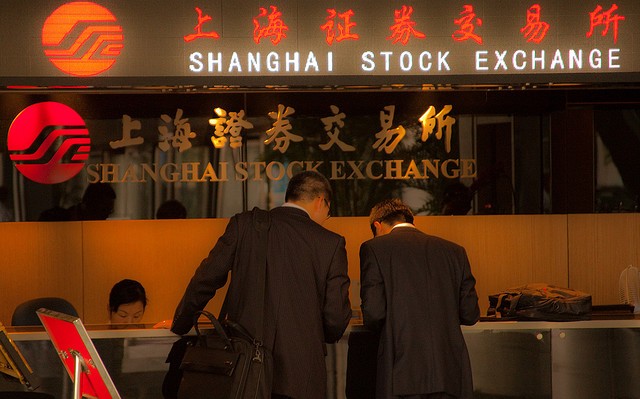Top U.S. Venture Firms Funded Blacklisted Chinese Companies, House Committee Says

Five U.S. venture-capital firms invested a total of at least $3 billion in Chinese companies developing technology allegedly used in human-rights abuses and to benefit the Chinese military and government, according to a Congressional investigation.
A new report from the House Select Committee on the Chinese Communist Party looks at years of investment from venture-capital firms into artificial intelligence and semiconductor startups in China. Nearly two-thirds of the total invested by those firms, or $1.9 billion, went to AI companies whose technology is contributing to China’s military buildup and human-rights abuses, the report says. In some cases, the companies have been blacklisted by the U.S. government.
“Decades of investment—including funding, knowledge transfer, and other intangible benefits—from U.S. VCs have helped build and strengthen the PRC’s priority sectors,” says the report.
The committee doesn’t challenge the legality of the investments but calls for policy changes to ensure U.S. venture capital isn’t allowed to bolster Chinese national security and surveillance efforts.
The investigation began last year when the committee requested information from venture-capital investors, including some of the largest in the U.S.: Sequoia Capital, Qualcomm’s venture-capital arm, Walden International, GGV Capital and GSR Ventures. The firms invested money in China from U.S. limited partners such as pension funds and university endowments, the report says.
Many of the startup investments in the report occurred years ago, before Washington had designated the companies as national security threats and, in some cases, the venture firms have sold their stakes, the report says.
Sequoia said most of its China investments had been managed by its China arm, which has now become a separate, independent company. Qualcomm said it only had small investments in China. GGV Capital said it has screens for problematic investments and that it, too, is splitting off its China operation into a separate entity.
Walden and GSR didn’t respond to requests for comment on the report. GSR said previously the venture partners who worked on the deals scrutinized by the House committee are no longer at the firm.
The report says those five firms combined invested more than $140 million in AI companies that supply technology to the Chinese military or its contractors and more than $130 million into AI startups that are flagged by the U.S. government as aiding human-rights abuses.
The committee, set up last year, is increasingly trying to keep American businesses from aiding Beijing’s technology ambitions. It aims to slow China’s progress in technology that could end up being used against the U.S. in a military conflict or assist Beijing in building up a surveillance state.
“At least in advanced technology sectors, we need to cut off the flow of funds,” said the committee’s chairman, Republican Rep. Mike Gallagher of Wisconsin. “We can’t afford to keep funding our own destruction.”
The committee’s actions represent a shift in thinking in Washington about U.S. investment ties with China that has put some venture-capital firms in the hot seat. Many in Silicon Valley’s venture-capital community, in years past, were eager to invest in China to seize the opportunity of nascent tech companies selling to a large population and growing middle class of eager tech adopters. Washington used to support such investment as a way to encourage reform in China.
Years ago, Sequoia and GGV set up China arms, and others such as GSR and Walden invested in China while keeping their headquarters in the U.S. American firms provided the seed money for Chinese venture capital to blossom.
A Sequoia Capital spokeswoman said that the company’s China unit has always operated with a separate team managing a separate fund and making its own investment decisions, and as of December, the China business had been split off into an independent firm with a new name, HongShan. Sequoia Capital invests in the U.S. and Europe.
“We take U.S. national security issues seriously and have always had processes in place to ensure compliance with U.S. law,” the spokeswoman said.
A Qualcomm spokeswoman said its investments are generally small and constitute less than 2% of the total investments in the committee’s report.
A GGV Capital spokeswoman said the firm would complete its separation from its China fund by next month and that it has “been in compliance with all applicable laws and regulations” and will abide by any future investment regulations. It is also trying to sell its stake in some Chinese startups.
China has become a less attractive place to invest as U.S.-China tensions have intensified and Beijing’s control over the tech sector and capital flows have made investments riskier. U.S. venture-capital investments in China surged from about $1.2 billion in 2010 to a peak of more than $19 billion in 2018 and then collapsed to $1.3 billion in 2022, according to data provided by Rhodium Group.
President Biden last year issued an executive order to prohibit Americans from investing in some Chinese companies developing advanced semiconductors and quantum computers. The Senate last year passed a bill requiring U.S. investors to notify the government when they make certain large investments in certain critical technology from China and other adversaries. The legislation, however, failed after it was cut out of the national defense policy bill.
The new report calls for further restrictions on outbound investment.
It flags more than two dozen artificial-intelligence companies ranging from small startups to large multinational corporations, including ByteDance, the parent company of video-sharing app TikTok, and drone maker SZ DJI Technology.
ByteDance, the report says, raised more than $1.4 billion from Sequoia’s U.S. and China funds and an additional $600,000 from GGV Capital. ByteDance has raised more than $9 billion in total. The report says ByteDance has collaborated with companies involved in the repression of China’s minority Uyghur population in Xinjiang. DJI has raised tens of millions of dollars from Sequoia’s China unit and Walden International, the report says, and has provided drones to the Xinjiang public-security force. Washington has sanctioned DJI as being a surveillance tool used by Beijing.
ByteDance declined to comment.
DJI says it has no ties to the military and discourages the use of its drones in any combat.
“We strongly deny any allegations against DJI regarding human-rights abuses. We have not engaged in any activities that violate or abuse human rights,” the company said.








